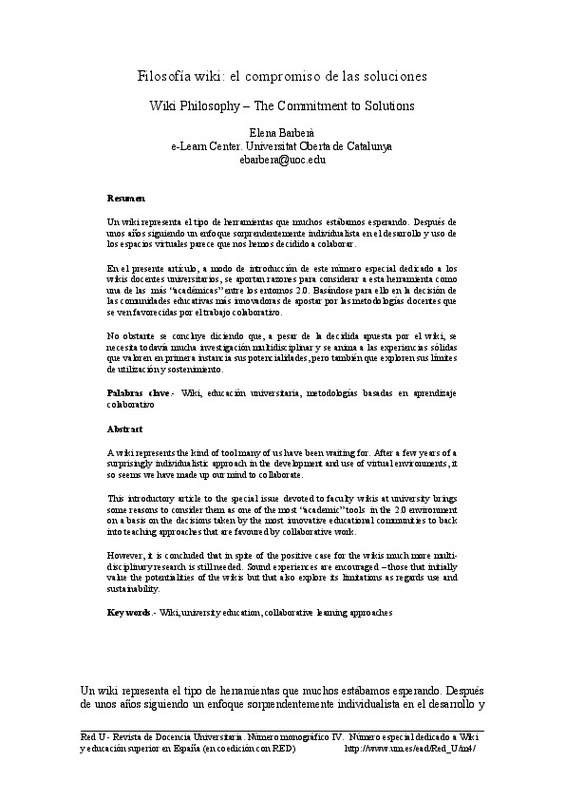JavaScript is disabled for your browser. Some features of this site may not work without it.
Buscar en RiuNet
Listar
Mi cuenta
Estadísticas
Ayuda RiuNet
Admin. UPV
Filosofía wiki: el compromiso de las soluciones
Mostrar el registro sencillo del ítem
Ficheros en el ítem
| dc.contributor.author | Barberà, Elena
|
es_ES |
| dc.date.accessioned | 2020-04-28T09:12:35Z | |
| dc.date.available | 2020-04-28T09:12:35Z | |
| dc.date.issued | 2009-12-15 | es_ES |
| dc.identifier.issn | 1887-4592 | es_ES |
| dc.identifier.uri | http://hdl.handle.net/10251/141696 | |
| dc.description.abstract | [ES] Una wiki representa el tipo de herramientas que muchos estábamos esperando. Después de unos años siguiendo un enfoque sorprendentemente individualista en el desarrollo y uso de los espacios virtuales parece que nos hemos decidido a colaborar.En el presente artículo, a modo de introducción de este número especial dedicado a las wiki docentes universitarias, se aportan razones para considerar a esta herramienta como una de las más “académicas” entre los entornos 2.0. Basándose para ello en la decisión de las comunidades educativas más innovadoras de apostar por las metodologías docentes que se ven favorecidas por el trabajo colaborativo.No obstante se concluye diciendo que, a pesar de la decidida apuesta por la wiki, se necesita todavía mucha investigación multidisciplinar y se anima a las experiencias sólidas que valoren en primera instancia sus potencialidades, pero también que exploren sus límites de utilización y sostenimiento. | es_ES |
| dc.description.abstract | [EN] A wiki represents the kind of tool many of us have been waiting for. After a few years of a surprisingly individualistic approach in the development and use of virtual environments, it so seems we have made up our mind to collaborate.This introductory article to the special issue devoted to faculty wikis at university brings some reasons to consider them as one of the most “academic” tools in the 2.0 environment on a basis on the decisions taken by the most innovative educational communities to back into teaching approaches that are favoured by collaborative work.However, it is concluded that in spite of the positive case for the wikis much more multidisciplinary research is still needed. Sound experiences are encouraged – those that initially value the potentialities of the wikis but that also explore its limitations as regards use and sustainability. | es_ES |
| dc.language | Español | es_ES |
| dc.publisher | Universitat Politècnica de València | es_ES |
| dc.relation.ispartof | REDU. Revista de Docencia Universitaria | es_ES |
| dc.rights | Reconocimiento - No comercial - Sin obra derivada (by-nc-nd) | es_ES |
| dc.subject | Wiki | es_ES |
| dc.subject | University education | es_ES |
| dc.subject | Collaborative learning approaches | es_ES |
| dc.subject | Educación universitaria | es_ES |
| dc.subject | Metodologías basadas en aprendizaje colaborativo | es_ES |
| dc.title | Filosofía wiki: el compromiso de las soluciones | es_ES |
| dc.title.alternative | Wiki Philosophy – The Commitment to Solutions | es_ES |
| dc.type | Artículo | es_ES |
| dc.identifier.doi | 10.4995/redu.2009.6257 | es_ES |
| dc.rights.accessRights | Abierto | es_ES |
| dc.description.bibliographicCitation | Barberà, E. (2009). Filosofía wiki: el compromiso de las soluciones. REDU. Revista de Docencia Universitaria. 7(3):1-4. https://doi.org/10.4995/redu.2009.6257 | es_ES |
| dc.description.accrualMethod | OJS | es_ES |
| dc.relation.publisherversion | https://doi.org/10.4995/redu.2009.6257 | es_ES |
| dc.description.upvformatpinicio | 1 | es_ES |
| dc.description.upvformatpfin | 4 | es_ES |
| dc.type.version | info:eu-repo/semantics/publishedVersion | es_ES |
| dc.description.volume | 7 | es_ES |
| dc.description.issue | 3 | es_ES |
| dc.identifier.eissn | 1887-4592 | es_ES |
| dc.relation.pasarela | OJS\6257 | es_ES |
| dc.description.references | Barton, M. (2004). Embrace the wiki way! [Versión electrónica]. May, 21, 2004 -14:34. Consultado el 1° de diciembre 2009 en http://www.mattbarton.net/tikiwiki/ | es_ES |
| dc.description.references | Berge, L. Z., Collins, M., y Dougherty, K., 2000. "Design Guidelines for Web-Based Courses". En: Beverly Abbey (Ed.) Instructional and Cognitive Impacts of Web-Based Education. Hershey, PA: Idea Group Publishing. | es_ES |
| dc.description.references | Gunawardena, C. (1995). Social presence theory and implications for interaction and collaborative learning in computer conferencing. International Journal of Educational Telecommunications, 1(2-3), 147 - 166. | es_ES |
| dc.description.references | Lamb, B. (2002). Open Spaces: Wikis, Ready or Not. [Versión electrónica]. EDUCAUSE Review, 39(5), September/October 2004, 36-48. Consultado el 8 de junio de 2006 en http://www.educause.edu/pub/er/erm0. | es_ES |
| dc.description.references | Leuf, B., & Cunnignham, W. (2001). The wiki way: Quick collaboration on the web. Boston: Addison Wesley. | es_ES |
| dc.description.references | Palloff, R. M. y Pratt, K., 2001. Lessons from the cyberspace classroom. The realities of online teaching. San Francisco, CA: Jossey-Bass. | es_ES |
| dc.description.references | Muirhead, B. (2004). Research insights into interactivity. [Versión electrónica]. Consultado el 4 de diciembre de 2009 en http://www.itdl.org/Journal/mar_04/ | es_ES |
| dc.description.references | Scardamalia, M., & Bereiter, C. (1994). Computer support for knowledge-building communities. Journal of the Learning Sciences, 3(3), 265-283. | es_ES |
| dc.description.references | Schwartz, L., Clark, S., Cossarin, M., & Rudolp, J. (2004). Educational Wikis: features and selection criteria. International Review of Research in Open and Distance Learning. [Versión electrónica]. Recuperado el 3 de diciembre de 2009 en http://cde.athabascau.ca/softeval. | es_ES |








